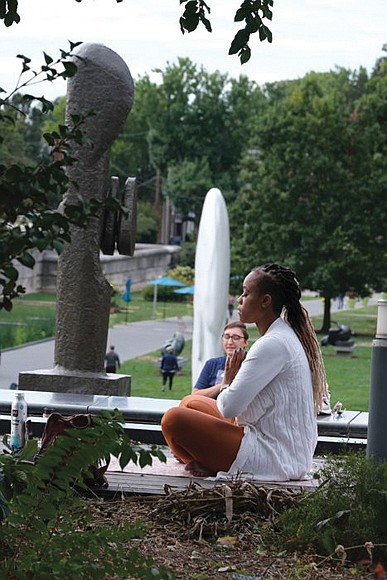Black women benefit from more mind, body, spirit practices
Debora Timms | 8/31/2023, 6 p.m.
Khepera Sankara was at rock bottom when she attended her first yoga class in 2013. It was an Ashtanga class taught by yoga teacher Robbie Norris as part of a program that brought yoga to the Richmond City Jail, where Ms. Sankara was incarcerated for shoplifting.
“It was a godsend,” she said in a recent phone interview. “I found it so profoundly transformational. Just the physical practice helped change my mind and body so much that I wanted to get deeper into the philosophy of the practice.”
Those first classes were challenging. Ms. Sankara says that while she had flexibility, she lacked strength and initially found some of the balancing postures difficult. However, she kept her focus positive and soon saw improvement.
“I entered the class with a curiosity,” Ms. Sankara recalled. “I left excited to come back and learn what else was possible for me.”
Practices such as yoga, meditation and mindfulness have been growing in popularity, with the Centers for Disease Control’s National Center for Health Statistics reporting that the number of people who meditate almost tripled between 2012 and 2017. As with all groups, the number of Black women participating in mind, body, spirit-focused activities is increasing — as are the programs and events being designed and marketed to them.
There are many different practices that pro- mote mindfulness and expanding awareness of our inner selves. Yoga is one, but even within yoga, there are many different styles that can be grouped into four main categories. Jnana — the yoga of knowledge, Bhakti — the yoga of devotion, Karma — the yoga of service and Raja — the main yoga practiced in the United States. Some of the most recognized classes — vinyasa, ashtanga, hot yoga, power yoga and hatha — are all forms that use the physical body as a gateway to self-realization.
Jana Long, co-founder and executive director of the nonprofit Black Yoga Teachers Alliance, became a certified yoga instructor in 2006, but she started practicing yoga as a 19-year-old where she grew up in Washington, D.C. Now 71 and living in Baltimore, she says she spent decades almost always being the only Black person in classes that popped up sporadically around the city.
“The first Black yoga teacher I ever met was more than 30 years into my practicing yoga,” Ms. Long said. “He walked into the gym where I was a member and said he was going to teach yoga. He looked like Black Jesus — I signed up immediately.”
Ms. Sankara noted that while her first classes in jail were mainly filled with Black women, it was a different story upon her release from jail later that year. She says she sought out spaces and teachers who looked like her, but even in those classes the majority of those in attendance were white.
“It does show the need for us expanding and sharing the practice with our community,” she said, adding that in 2017 she herself became a registered yoga instructor in kemetic yoga — a very different style that moves slowly and en- compasses postures that are very accessible and can be modified to anyone.
Both women say that as yoga and other mind- fulness practices have become more mainstream, more Black women are starting to embrace the practice, or at least are curious to try them.
“Yoga is a way for women, and specifically Black women, to find their strength,” Ms. Long said. “I believe that Black women are very fragile people who have not been fully accepted in American culture. Yoga can offer the tools to self-acceptance and self-love. I think we seek that affirmation.”
Also, given the many health disparities in the Black community, there are real health benefits that can be gained, she said.
Author and transformation coach Patrice Gaines has taught meditation and transforma- tional workshops centered around Black women for years. She believes another reason increased programming and attendance to such sessions is because Black teachers and practitioners are becoming better known.
“I suspect social media is a big factor,” Ms. Gaines said in an email. “More Black women are aware of Black teachers, which has made an incredible difference for both.”
“It’s been my experience that when you get a workshop of Black women, there are experiences that come up that they feel comfortable sharing because they know they are among people who can relate or may have the same worries or distractions from peace,” she added.
Ms. Sankara said that such meditative practices also can be empowering. She teaches classes at The Well Collective in Shockoe Bottom and founded Sankara Wholistic Wellness online this year. She also offers a community healing practice once a month, with the next scheduled for Sept. 17 in Forest Hill Park.
Angel V. Shannon founded Seva Health, LLC in Pikesville, Md. in 2013 as a nurse practitioner offering integrative medicine for adults and seniors.
“It was interesting to me when I was in critical care and ICU because I was always looking for ways to weave what I truly, truly believe good health is all about. It really is harmony of mind, body, spirit and living in connection with nature,” Mrs. Shannon said by phone.
She adds that holistic practices and workshops are an opportunity for Black women to explore other avenues of healing in a system where there is still a lot of medical mistrust. They can also help give Black women the language to advocate for their care choices in clinical appointments with a sense of urgency and empowerment.








